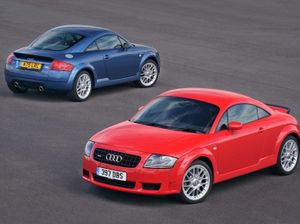The history of the Audi TT
As Audi’s iconic sports model bows out of production, we look back at its history.

There are some cars that offer an incredibly recognisable shape and silhouette, and one of those is the Audi TT.
Across its three generations, all versions have shared similar styling, and have built up a loyal following since the TT was first introduced in 1998. It’s become one of the most iconic pieces of car design in modern history.
But the TT will soon be no more, as Audi looks to focus more on electrification, which this petrol-powered sports car just can’t be a part of. Ahead of the model being discontinued later in 2023, we take a look back at the TT’s history.
1995 – The concept begins

The TT story began fully in 1995 when Audi presented a concept version of its sports car at the Frankfurt Motor Show. There was a noticeable gap in the German firm’s line-up for a more affordable sporting model, and the TT aimed to fit the bill, with its cool shape and fun drive.
The TT gets its name from the famous Isle of Man Tourist Trophy (TT) bike racing.
1998 – Concept becomes reality

Concept cars are often far-fetched models that only show a tiny part of what may end up making production.
Not the TT, however, as when Audi presented the production model three years later, it shared sharp similarities with the original concept car, with its cool shape and design details remaining intact. The Coupe model was presented in 1998 with a drop-top Roadster version arriving a year later.





